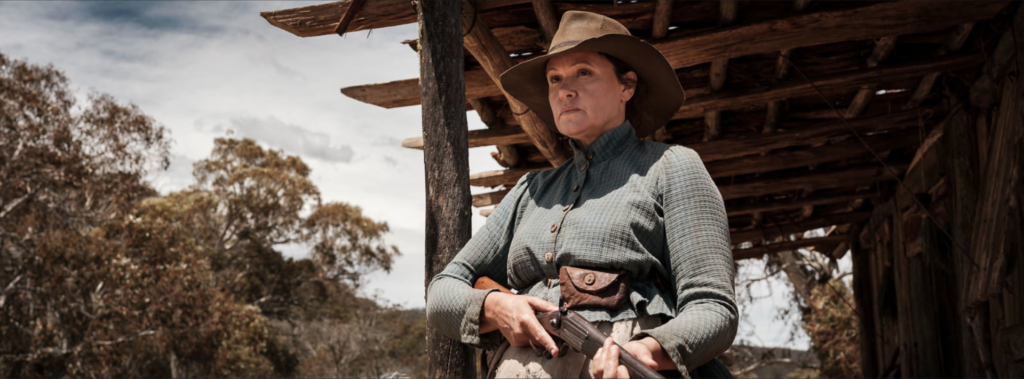Leah Purcell is a proud Goa-Gungarri-Wakka Wakka Murri woman from Queensland, Australia. She is an internationally acclaimed playwright, screenwriter, director, novelist, actor, cultural icon, and activist whose work stands at the forefront of the Black and Indigenous cultural renaissance and protest movement sweeping Australia and the world.
“The Drover’s Wife: The Legend of Molly Johnson” is screening at the 2021 SXSW Film Festival, which is taking place online March 16-20.
W&H: Describe the film for us in your own words.
LP: It is a Western thriller set in 1893 in the High Country of the Snowy Mountains in Australia. It is a story about a woman who will go to great lengths to protect the ones she loves. It is also about Place, and I have used the traditional elements of my People’s storytelling including Songlines and a Dreaming structure.
W&H: What drew you to this story?
LP: When I was a little girl my mother would read to me “The Drover’s Wife,” a classic short story by Henry Lawson, arguably Australia’s most famous writer. I still have the same book my Mum used to read from. To some degree the story represented me and my Mum’s situation. So this story has been with me for 45 years.
I fell in love with the High Country when I was acting in a film, shot in that location in 2006. I made a promise to myself that I would come back to film my own movie here. And in 2019 I kept that promise and made that dream a reality.
W&H: What do you want people to think about after they watch the film?
LP: Most importantly, I hope that they have gone on an emotional journey with my characters and were entertained. I hope they are intellectually stimulated by the underlying issues which trigger conversation that hopefully brings an understanding to the issues that are foundational to my film.
W&H: What was the biggest challenge in making the film?
LP: I wrote, directed, co-produced, and starred in this film. It was a period piece shot entirely on location with four children and animals. Need I say anymore? Ha! But I loved every minute and would do it again in a heartbeat.
W&H: How did you get your film funded? Share some insights into how you got the film made.
LP: It was a combination of funding that got us there in the end.
In Australia, we have government support for our films. Screen Australia and Screen New South Wales were our major investors along with private investment and donations courtesy of charity status which made up the budget. So it was a blend of industry, private equity, and donations that enabled our film to be funded.
W&H: What inspired you to become a filmmaker?
LP: To tell First Nations stories, drawn mainly from my family history, giving heart and soul to otherwise politicalized First Nation issues. Giving our stories their authentic voice but maintaining a commercial focus to attract wide and diverse audiences.
I’ve also been acting for 30 or so years now and directing theater, television, documentary, and short film for the last 15 years, so I thought the time was right to direct my debut feature that I adapted and based on my stage play and novel of the same name.
W&H: What’s the best advice you’ve received?
LP: As a film director the best advice, which came from my mentor director Ray Lawrence, was to cast and hire the right actors and crew for your film because then your job as a director is half done.
W&H: What advice do you have for other women directors?
LP: To continue to believe in yourself, keep backing yourself, supporting each other, and continue to tell these amazing, powerful, and transformative stories.
W&H: Name your favorite woman-directed film and why.
LP: A female director that inspired me was Penny Marshall. She’s a triple threat – acting, directing, producing. She was trailblazing back in the ’70s with her acting in “Laverne & Shirley” and chipped away at Hollywood in the ’80s with her direction. She stood her ground in a man’s world. She’s had great success because of her work ethic and her caliber of work is a testament to her.
W&H: How are you adjusting to life during the COVID-19 pandemic? Are you keeping creative, and if so, how?
LP: I am fortunate enough to say that I have been able to continue on with my work. I have never been busier than during the COVID-19 pandemic. I finished my film one step ahead of the mega bushfires, Australia’s worst natural disaster, in November 2019. Then the pandemic came and I got to picture lock-off March 13, 2020 and Australia went in to COVID-19 lockdown March 16, 2020. It seemed I was one step ahead of one disaster after another, so I put it down to the Ancestors watching over and protecting me.
Given I am an actor, writer, director, and producer with my own production company, I have had more scripts and projects come my way than ever before. Our industry last year was largely in-development due to the pandemic. So I was busy and still am very much so. The other thing is Australia has handled the pandemic so well that we have been back in to production since middle of last year. So yes, I’ve been busy.
W&H: The film industry has a long history of underrepresenting people of color onscreen and behind the scenes and reinforcing — and creating — negative stereotypes. What actions do you think need to be taken to make Hollywood and/or the doc world more inclusive?
LP: Actions speak louder than words, so open the doors, back, support, speak up, speak out, help guide, finance, and nurture these talents and their authentic voices. Give them the platforms to be heard and seen from. Let them drive their projects. Give someone a go. Give someone a chance.







